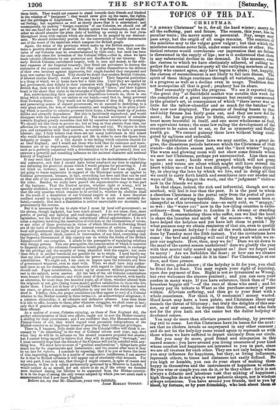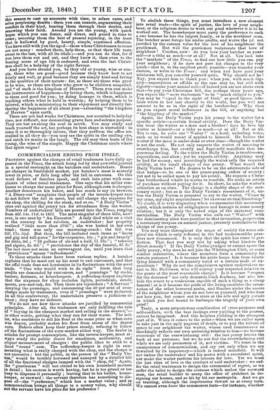TOPES OF THE DAY.
CHRISTMAS.
" A MERRY Christmas" be it, for all the hard winter; merry fo? all the suffering, past and future. The season, this year, has peculiar traits ; the merry moral is perennial. Nay, usage may pass away, but the origin of all usage remains. The sanction of the mistletoe may to the vulgar grow vulgar ; but that which the mistletoe sanctions never fails, under some sanction or other. Ste. tistical returns would corroborate our impression that no failure is threatened in the supply of lips ; nor is it understood that there is any substantial decline in the demand. In like manner, even the custom to which we have obstinately adhered, of calling to. gether for an annual dinner-party all the outlying members of onr family who cannot agree, may have begun to abate; but, happily, the custom of reconcilement is not likely to fall into disuse. The spirit of these things continues through all variations, and there is a progress as well as a decline even in usage. Tradition does not monopolize all that is good ; prophecy has its share.
Beef seasonably typifies the progress. We see it reported that "the great day" at Smithfield market was notable this week for the completion of a great improvement but recently commenced in the grazier's art, in consequence of which "there never was so little for the tallow-chandler and so much for the butcher" as they now saw displayed. The practice of feeding beasts to that unwieldy fatness has fairly gone out, and they are now fed for meat ; fat has given place to fibrin, obesity to symmetry. A beast more beautiful in itself, and one more wholesome as food, are equivalent terms; the same law ruling the development of the creature to be eaten and to eat, so far as symmetry- and fleshly health go. We cannot gainsay those laws without being casti- gated by ugliness and unhealth.
To forgetfulness of those laws we may ascribe in a great de- gree, the disastrous periods between which the Christmas of 1849 stands—the cholera season past, and the "hard winter" begun. The warm and glowing room will not show some friends Idiom we saw last Christmas, perhaps yet unreconciled. Lips then met to meet no more; hands were grasped which will not grasp again; and voices are silent which might still have stirred the heart within us—if we had been diligent, during the days slipped
i by, in obeying the laws by which we live, and n doing all that we could to carry forth health and seemliness into our abodes and ways of life. We forgot the work, and the "judgment" visits us now in the friends we miss.
In that shape, indeed, the rich and influential, though not un- scathed, will feel it less than the poor. It is the poor to whom a cheerless Christmas is the portal only from the period of pesti- lence to one of starving hardship. Seldom has a season been so changeful as this intermediate one—so early: cold, so "muggy," so wet : the "water out" now in the low-lying counties is extra- ordinary—from Yorkshire to London it is swamp or standing pool. How, remembering those who suffer, can we find the heart to share the luxuries and mirth of the season—we, who might have helped the helpless and yet have left them to perish ? By what penance may we obtain remission of that sin, even to qualify us for this present holyday ?—for all the work undone cannot be done by Tuesday next the 25th instant. Yet the invitations have come ; the beef and pudding will cool if they await while we re- pair our neglects. How, then, may we do? Dare we sit down to the meal of the sacred season unshrieved? dare we glorify the year with that mortal tally scored up against U8 ? dare we forget and be merry ? Are we forbidden the feast ; or how can we cleanse ourselves of the taint—and do it in time? For Christmas:is at our door, and time presses.
Be at ease, good sinner ; if the holyday is fit for you, you shall be fitted for its feast. You may regain your right of rejoicing, upon due payment of fine. Right is not so tyrannical as Wrong, but ever welcomes the sincere penitent ; and you can earn your pardon in many ways. If you have substance, think then of "the houseless beggar old "—of the race of those who need ; and let Luxury pay its tribute to Want as the purchase-money of peace within. Alleviate suffering, and then go to your feast with a whole conscience. Nor think it, 0 economist I money wasted. Hard heart may have a keen palate, and Christmas cheer may console the throat of Gluttony ; but truly the delights of this sea- son, as of any season, lie deeper than the throat, and who feels not for the poor hath not the easier but the duller holyday of deadened senses.
You may do more than alleviate present suffering, by prevent- ing evil to come. Let this Christmas have its lesson for the next : see that no cholera invade us unprepared in any other summer ; and do not let the holyday come round again to reproach us with those whom we have suffered to depart untimely from our circle.
But you may do more, good friend and companion in this sacred season : you have around you living creatures of your kind whose comfort and happiness are intrusted to you in part, since we are all trustees for each other. They are not only beings whom you may influence for happiness, but they, as living influences, represent others, to times and distances not easily defined. Be you high or humble, you can do your share of making them happy in themselves and the instruments of happiness to others. Be you wise or simple you can do it, or be they either : for it is not always a didactic and laborious task that making of happiness ; high thoughts do not always wear pedantic shapes, nor is wisdom fizza conscious. You have around you friends, tied to you by by fortune, or by pure friendship, who look shot* *us. sd this season to cast up accounts with time, to solace cares, and solve perplexing doubts : them you can console, augmenting their comfort in their kind, bearing them through their doubts, and renewing their faith. Around you are the young, with quick hopes which you can foster, and direct, and guard in time to come; securing them the best of present rejoicing, in the feast that is hallowed by good, hearty, simple, expressed affection. You have still with you the aged—those whose Christmases to come are not many : comfort them, help them, so that their life taste sweet to the last, with all its trials ;—and you can do that, for if you love them out and out, and they know it, then even to the waning sense of age life is endeared, and even the last Christ- mas shall be a holyday of the right flavour.
And you have around you, be they old or young, wise or sim- ple, those who are good—good because they know how to act wisely and well, or good because they are simply kind and loving in the qualities of their nature : for, as there are those who grow to be wise, so there are those who grow to be children unspoiled, and "of such is the kingdom of Heaven." Them you can make the instruments of happiness—by loving them, which is happiness to them and good for you ; by doing homage to them, which is teaching others what to hold in worship ; by helping them to he beloved, which is ministering to their enjoyment and directly fur- thering the happiness of all about you—extending "the kingdom of Heaven" upon earth. These are not bad works for Christmas, nor unsuited to holyday time, nor difficult, nor demanding grave face and solemn purpose. They are but awaking the soul in mirth. You may study and teach yourself the art, but perhaps its best shape is unstudied : in some it is so thoroughly inborn, that they perform the office un- studied in all they do—you may see the spirit in the smiling eye, and catch its music in the laugh. The old may then learn of the young, the wise of the simple. Happy the Christmas circle where that spirit reigns I



























 Previous page
Previous page